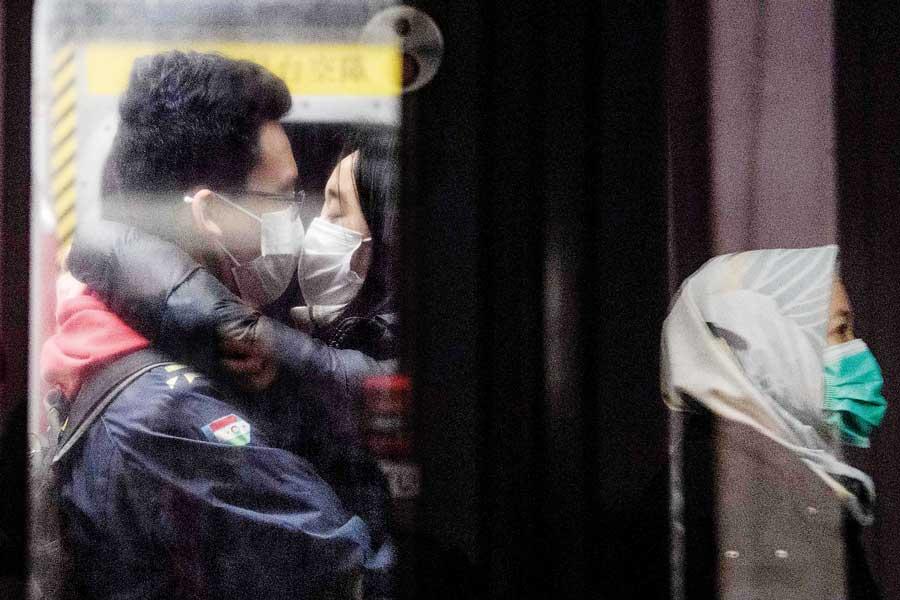28 Jan 2020 - {{hitsCtrl.values.hits}}

A couple wearing face masks kiss on an underground metro train as another passenger (R) is reflected on a platform glass door during a Lunar New Year of the Rat public holiday in Hong Kong on January 27, 2020, as a preventative measure following a coronavirus outbreak, which began in the Chinese city of Wuhan
(Hong Kong) AFP: World stock markets and oil prices plunged yesterday, as panicking investors bolted for safer assets after China warned that the spread of a deadly coronavirus was accelerating.
China extended its biggest national holiday to buy time in the fight against a viral epidemic and neighbouring Mongolia closed its border, after the death toll spiked to 81 despite unprecedented quarantine measures.
Approaching the half-way stage in Europe, Frankfurt sank 2.3 percent, London dived 2.5 percent and Paris shed 2.4 percent, as fears mounted over the overall impact on the global economy.
Benchmark oil prices tanked 3.5 percent with trade slammed by concerns over demand from the world’s top energy consumer China, but haven assets like gold and the yen rallied. “Market participants in Europe have grave concerns about coronavirus,” said Ava Trade analyst Naeem Aslam.
“The bottom line is that the virus has become deadly and it has caused a major panic in markets.” Chinese President Xi Jinping warned over the weekend that China was facing a “grave situation” given the “accelerating spread” of the new SARS-like virus that has infected nearly 1,300 people across the country.
As the number of people infected affected worldwide approached 3,000, analysts said there were growing fears the crisis could become as bad as the Severe Acute Respiratory Syndrome (SARS) outbreak that hammered Asian markets in 2003.
“Coronavirus fears have gripped the markets .. as all the major European equity benchmarks are nursing big losses,” said analyst David Madden at trading firm CMC Markets UK.
“Stocks that are connected to China are feeling the pain ... as traders are afraid the health crisis will curtail economic activity.”
The outbreak has led China to lock down the epicentre of the disease, Wuhan -- a city of 11 million people -- while imposing tight travel restrictions on a number of other cities including Beijing.
The move comes during the Lunar New Year holiday when hundreds of millions of people criss-cross the country and spend billions of dollars. The government decided late Sunday it would extend the holiday and related school closures beyond January 30 end date to “reduce population flows”, state media said.
Most Asian markets were closed for the Lunar New Year break, but Tokyo was open and fell two percent. Bangkok plunged nearly three percent on worries about the Thai travel sector.
The flight to safety saw the yen rally against the dollar, with the unit now up more than one percent from eight-month lows touched earlier this year.
Gold, another go-to asset in times of turmoil and uncertainty, is heading back towards US $ 1,600 per ounce and the six-year peaks touched at the start of January.
While the main focus is on the spread of the virus, traders will also be keeping an eye on the release of earnings this week from top companies including Apple, Facebook and Samsung.
The oil market had already tumbled more than 6 percent last week owing to concerns about the effects on demand in China, which is the world’s number two economy after the United States.
(Riyadh) AFP: Top oil exporter Saudi Arabia said yesterday that the impact of a deadly coronavirus epidemic on oil demand was “extremely limited” but that the kingdom was closely following events.
Oil prices plunged yesterday, with Brent crude dropping below US $ 60 a barrel for the first time in almost three months amid fears over the economic effects of the epidemic, which has killed over 80 people in China.
But the outbreak’s impact “on the global demand for oil is extremely limited,” Energy Minister Prince Abdulaziz bin Salman said in a statement cited by the SPA state news agency.
“A big part of the impact on global markets including the petroleum markets... is driven by psychological factors” and “pessimistic views” among dealers, he added.
Prince Abdulaziz recalled that the 2003 outbreak of Severe Acute Respiratory Syndrome (SARS) did not push down demand for oil.
He said Saudi Arabia was “closely watching” developments in oil markets, the global economy and that of China, a major buyer of Saudi crude.
“The kingdom and the OPEC+ alliance (of oil exporters) have the capability and the flexibility to respond to any changes... to support the stability of the oil markets, if needed,” he said.
16 Nov 2024 1 hours ago
16 Nov 2024 1 hours ago
16 Nov 2024 2 hours ago
16 Nov 2024 2 hours ago
16 Nov 2024 3 hours ago